
Mathematics and Financial Economics
Scope & Guideline
Bridging Theoretical Mathematics and Practical Economics
Introduction
Aims and Scopes
- Mathematical Modeling in Finance:
The journal extensively covers mathematical models applied to financial markets, risk management, and investment strategies. This includes stochastic modeling, optimization techniques, and game theory applications. - Risk Management and Insurance Economics:
Papers often explore models for managing financial risk, including insurance strategies and capital allocation under uncertainty, highlighting the importance of robust decision-making frameworks. - Dynamic Programming and Control Theory:
A significant focus is on dynamic programming methods in financial contexts, particularly in optimal control problems related to portfolio management and consumption-investment decisions. - Mean Field Game Theory Applications:
The journal features research that applies mean field game theory to economic and financial systems, addressing collective behaviors of agents and their implications for market dynamics. - Interdisciplinary Approaches:
There is a consistent emphasis on interdisciplinary research, integrating insights from economics, finance, and applied mathematics to tackle complex financial issues.
Trending and Emerging
- Mean Field Game Theory:
There is a notable increase in the application of mean field game theory, particularly in modeling interactions among agents in financial markets and their collective behaviors, which is crucial for understanding systemic risk. - Robust Optimization and Utility Maximization:
Emerging research on robust optimization techniques showcases a growing emphasis on developing strategies that perform well under uncertainty and model ambiguity, essential for real-world financial decision-making. - Dynamic Asset Allocation Strategies:
The trend towards dynamic asset allocation reflects the need for adaptive strategies that respond to changing market conditions and investor preferences, particularly in volatile environments. - Environmental and Social Governance (ESG) Factors:
Increasing attention to ESG factors indicates a shift towards integrating sustainability considerations into financial models, which is becoming increasingly relevant in investment decisions. - Advanced Risk Management Techniques:
The rise of complex risk management frameworks that incorporate systemic risk, contagion effects, and network analysis highlights a growing recognition of interdependencies in financial systems.
Declining or Waning
- Traditional Portfolio Optimization Techniques:
There seems to be a waning interest in classical portfolio optimization methods, as newer, more complex models incorporating dynamic and stochastic elements gain traction. - Static Risk Assessment Models:
Static models for risk assessment are becoming less prevalent, as researchers shift towards dynamic frameworks that better capture the evolving nature of financial markets. - Single-Asset Models:
Research focusing solely on single-asset models appears to be declining, as there is a growing trend towards multi-asset frameworks that consider interactions between various financial instruments. - Basic Economic Equilibrium Models:
Basic models of economic equilibrium are receiving less attention, with a preference for more nuanced approaches that incorporate factors such as market frictions and behavioral economics. - Deterministic Financial Models:
The use of deterministic models is decreasing, as stochastic models that account for uncertainty and variability in financial processes are favored.
Similar Journals

Probability Uncertainty and Quantitative Risk
Fostering Interdisciplinary Dialogue on Probability and RiskProbability Uncertainty and Quantitative Risk, published by the American Institute of Mathematical Sciences (AIMS), is a distinguished open-access journal that has been contributing to the academic community since its inception in 2016. With a focus on the crucial interplay between probability, uncertainty, and quantitative risk assessment, this journal serves as a vital platform for researchers, practitioners, and students engaged in the fields of Applied Mathematics and Statistics. The journal's ranking in the Q2 category for both Applied Mathematics and Statistics and Probability reflects its growing influence and relevance, while its diverse scope encourages interdisciplinary studies. As a part of the Scopus database and maintaining a consistent publication pace through 2024, Probability Uncertainty and Quantitative Risk is essential for anyone looking to remain at the forefront of research in risk analysis and uncertainty modeling. Its commitment to open access since 2016 further enhances accessibility to cutting-edge findings, making it an indispensable resource for academics and industry professionals alike.
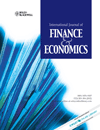
INTERNATIONAL JOURNAL OF FINANCE & ECONOMICS
Exploring the Frontiers of Economic ResearchInternational Journal of Finance & Economics, published by Wiley, is a premier academic journal that serves as a vital resource for researchers and professionals in the fields of finance, accounting, and economics. With an impressive impact factor and a reputation for excellence, the journal is recognized in the 2023 Scopus rankings, placing in the top quartiles across multiple categories, including Q2 in Accounting, Economics, and Finance. The journal has been a significant contributor to academic discourse since its inception in 1996, with its converged years extending to 2024, thereby ensuring the continuous advancement of knowledge in these critical areas. Although it operates under a traditional subscription model, its comprehensive articles provide insightful analyses, empirical research, and theoretical advancements that cater to a diverse audience—from seasoned scholars to emerging students in the field.
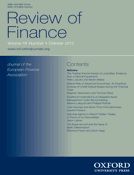
Review of Finance
Cultivating excellence in finance, accounting, and economic scholarship.The Review of Finance, published by Oxford University Press, stands as a premier academic journal in the fields of Finance, Accounting, and Economics. With an ISSN of 1572-3097 and an impressive track record stretching from 2001 to 2024, this journal is consistently recognized for its high-quality research, reflected in its Q1 rankings across key categories, including Accounting, Finance, and Economics and Econometrics. The Review of Finance is dedicated to advancing the understanding of financial phenomena through robust empirical and theoretical insights, making it an essential resource for researchers and professionals alike. Additionally, its strong Scopus rankings, placing it in the top percentiles, highlight its influence and relevance in ongoing academic discourse. Although the journal is not open access, it remains widely accessible through academic institutions, ensuring that its valuable contributions reach an extensive audience. The editorial board invites submissions that promise to further engage the academic community in the dynamic intersections of finance, accounting, and economic research.

American Economic Journal-Macroeconomics
Unraveling Complexities of Economic DynamicsAmerican Economic Journal-Macroeconomics, published by the American Economic Association, stands at the forefront of economic research, addressing pivotal macroeconomic issues that shape global economies. With an impressive Scopus rank of #8 out of 288 in its field and a notable 97th percentile ranking, this journal is widely regarded as a top-tier publication, specifically categorized in the Q1 category for Economics, Econometrics, and Finance as of 2023. Operating under ISSN 1945-7707 and E-ISSN 1945-7715, it aims to disseminate high-quality research from 2009 through 2024 and beyond, providing crucial insights into macroeconomic theory and policy. Although the journal currently does not operate under an open access model, it remains a vital resource for researchers, economists, and students seeking to deepen their understanding of macroeconomic dynamics and their implications for economic policy worldwide. The journal's impactful contributions make it an essential read for those striving to influence economic thought and practice.
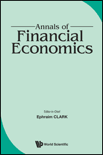
Annals of Financial Economics
Fostering Innovation in Financial Research and PolicyAnnals of Financial Economics, published by World Scientific Publishing Co. Pte Ltd, is a premier scholarly journal catering to the fields of finance, economics, and international management. With an impressive impact factor and categorized in the Q2 quartile across multiple disciplines in the 2023 rankings, the journal holds a prominent position among its peers, evidenced by its ranking in the top 15% for Economics and Econometrics and Finance categories. The journal aims to foster high-quality, innovative research that addresses contemporary financial issues, making it a vital resource for researchers, professionals, and students alike. Although it does not operate under an open access model, it ensures that its contributions advance scientific discourse and provide valuable insights into financial theories, practices, and policies. With a historical publication span from 2005 to 2009 and again from 2011 to 2024, the Annals remains a critical platform for disseminating transformative ideas in financial economics, ensuring its relevance in a rapidly evolving scholarly landscape.

Computational Economics
Shaping the Future of Economics with Computational Innovation.Computational Economics is a premier journal dedicated to advancing the interdisciplinary field that bridges computational methods and economic theory. Published by Springer in the Netherlands, this journal serves as a critical platform for researchers and practitioners from economics, econometrics, and computer science, fostering innovation and cross-pollination of ideas from 1993 to 2024. With a notable impact factor in its categories—ranking Q2 in Economics, Econometrics, and Finance and Q3 in Computer Science Applications—Computational Economics consistently delivers rigorous peer-reviewed research that addresses contemporary challenges in economic modeling and computational techniques, making it an indispensable resource for the academic community. The journal provides a range of access options and is indexed in Scopus, where it holds a strong position in the 78th percentile of its category, ensuring high visibility and engagement for published works. Researchers, students, and professionals will find valuable insights across its diverse scope, facilitating the exploration of new methodologies that shape the future of economic analysis.
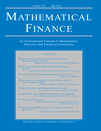
MATHEMATICAL FINANCE
Driving Innovation in Financial MethodologiesMATHEMATICAL FINANCE is a prestigious journal published by Wiley, focusing on the interdisciplinary fields of finance, applied mathematics, accounting, and economics. With its ISSN 0960-1627 and E-ISSN 1467-9965, this journal has earned its place in the top tier of academic publications, reflected by its Q1 rankings across multiple categories in 2023, including Accounting, Applied Mathematics, Economics and Econometrics, Finance, and Social Sciences. MATHEMATICAL FINANCE, which commenced publishing in 1991, is recognized for its rigorous peer-review process and its significant contribution to the advancement of knowledge in quantitative finance methodologies and risk management practices. Although it does not currently offer open access, the journal remains an invaluable resource for researchers, professionals, and students seeking to stay abreast of the latest theoretical advancements and empirical studies in mathematical finance. Its impact factor and Scopus rankings further illustrate its high standing within the academic community, making it an essential platform for impactful research and scholarly discourse.
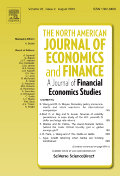
North American Journal of Economics and Finance
Fostering rigorous exploration in finance and economics.The North American Journal of Economics and Finance is a premier academic journal published by Elsevier Science Inc. since 1992, dedicated to advancing the field of economics and finance through rigorous research and scholarship. With an impressive impact factor and recognition in the Q2 category for Economics and Econometrics and Q1 for Finance as of 2023, this journal holds a significant position in the academic community, ranked #41 out of 317 in Finance and #100 out of 716 in Economics. The journal features high-quality, peer-reviewed articles that cover a broad range of topics, from theoretical frameworks to empirical analyses and practical applications. Though not an open-access platform, the journal provides valuable insights for researchers, practitioners, and students alike, promoting knowledge dissemination in the dynamic landscape of economic and financial studies. With its commitment to excellence, the North American Journal of Economics and Finance serves as an essential resource for those seeking to deepen their understanding of contemporary issues in these critical fields.
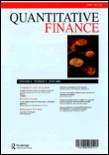
QUANTITATIVE FINANCE
Elevating discourse in finance through cutting-edge research.QUANTITATIVE FINANCE, published by Routledge Journals, Taylor & Francis Ltd, stands at the forefront of academic research in the dynamic fields of finance, economics, and econometrics. With a strong commitment to disseminating cutting-edge research, this esteemed journal, which has been published since 2001 and continues to thrive with an anticipated convergence until 2024, occupies a prestigious Q1 ranking in Economics, Econometrics, and Finance and a Q2 ranking in Finance as of 2023. It serves as an essential platform for interdisciplinary studies, aiming to bridge theoretical approaches and practical applications in quantitative methods. Researchers, professionals, and students are provided access to a wealth of high-quality articles that contribute to the ongoing discourse and advancements in these fields. As the journal continues to impact its community, QUANTITATIVE FINANCE remains an invaluable resource for those seeking to stay at the cutting edge of financial research and its applications globally.
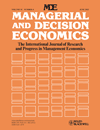
MANAGERIAL AND DECISION ECONOMICS
Advancing Managerial Insights Through Empirical ResearchMANAGERIAL AND DECISION ECONOMICS is a highly regarded academic journal published by John Wiley & Sons Ltd that serves as a vital resource in the field of business and management. With an ISSN of 0143-6570 and an E-ISSN of 1099-1468, this journal has established itself as a prominent platform for disseminating cutting-edge research from its inception in 1980 through to 2024. Currently ranked in the Q2 category across multiple fields—including Business and International Management, Management of Technology and Innovation, Management Science and Operations Research, and Strategy and Management—it highlights significant contributions within these domains. The journal is based in the United Kingdom and contributes to the ongoing dialogue and development of innovative managerial practices driven by empirical decision-making research. Although the journal does not offer open access, it remains highly influential, with noteworthy Scopus rankings showing its strong impact within the scholarly community. Researchers, professionals, and students alike will find valuable insights and advancements in management science that inform and enrich their practices and academic pursuits.